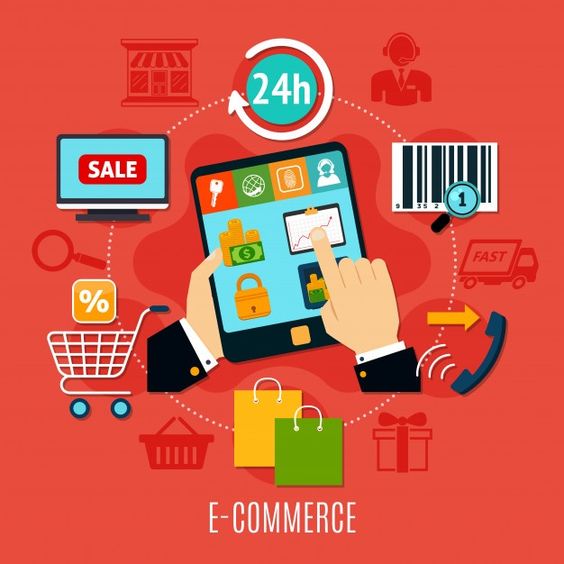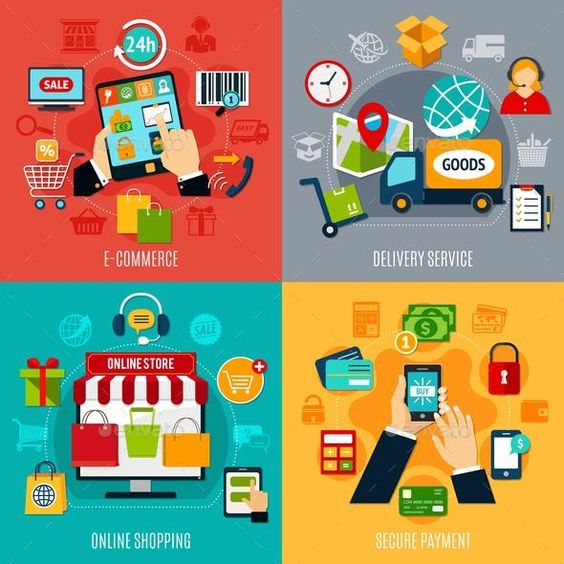
Introduction
E-commerce has completely changed the way we purchase, changing the retail industry and providing customers with convenience never seen before. When compared to the early days of online marketplaces, e-commerce has developed into a trillion-dollar sector that is still growing. These days, it operates through complex, multi-channel platforms. This blog examines the development, present, and potential of e-commerce.
The Evolution of E-commerce

- Early Beginnings With the development of the internet in the latter half of the 20th century, the idea of e-commerce was born. Early adopters who enabled customers to make purchases online, such as Amazon and eBay, set the foundation. These platforms swiftly grew to offer a wide range of products, originally concentrating on books and collectibles.
- Technological Advancements Technological developments have been essential to the development of e-commerce. Online shopping has become more dependable and accessible with the introduction of mobile technologies, high-speed internet, and secure payment channels. The customer experience has been further improved by features like quick returns, personalized recommendations, and user reviews.
Current Trends in E-commerce

- Mobile Commerce The use of smartphones has led to an unprecedented growth in mobile commerce, or m-commerce. Mobile devices are being used by consumers more and more to browse, compare, and buy things. Mobile wallets, mobile apps, and responsive design are now crucial elements of effective e-commerce campaigns.
- Social Commerce Social media sites are now effective e-commerce tools. Social commerce is the practice of selling goods to customers directly through websites like Facebook, Pinterest, and Instagram. Thanks to features like influencer marketing, live shopping events, and shoppable postings, social media has become an essential component of the e-commerce ecosystem.
- Personalization and AI By enabling customized purchasing experiences, artificial intelligence (AI) and machine learning are revolutionizing the e-commerce industry. AI systems examine customer behavior to provide dynamic pricing, individualized marketing messages, and customized product recommendations. By offering immediate support and guidance, chatbots and virtual assistants improve customer service.
- Sustainability and Ethical Shopping Consumers of today are becoming more and more concerned about ethical behavior and sustainability. In response, e-commerce companies are implementing sustainable product options, transparent supplier chains, and eco-friendly packaging. Eco-labels and certifications assist customers in making well-informed decisions and coordinating their purchases with their ideals.
Benefits of E-commerce

- Convenience With e-commerce, customers can purchase whenever and wherever they choose with unmatched ease. The limitations of traditional store hours are eliminated by the 24/7 availability of online stores. Customers may explore a wide selection of products, compare prices, and have purchases delivered right to their home with just a few clicks.
- Wider Selection An increased assortment of products can be found from online shops compared to traditional brick-and-mortar establishments. The lack of physical space constraints allows e-commerce platforms to carry a wide variety of products, including specialty and niche items that could be difficult to locate locally.
- Cost Savings E-commerce has the potential to reduce costs for businesses and consumers alike. Because they frequently have reduced overhead expenses, online shops may provide discounts and competitive prices. Customers gain from online sales and price comparison capabilities in addition to reduced transit expenses.
Challenges and Considerations
- Security Concerns Security in e-commerce is still a major worry. Ensuring secure transactions and safeguarding consumer data are critical. Strong cybersecurity measures, such as encryption, secure payment gateways, and frequent security audits, are imperative for e-commerce enterprises to invest in.
- Logistics and Fulfillment Effective fulfillment and logistics are essential to the success of e-commerce. Customer satisfaction depends on precise order fulfillment, prompt delivery, and efficient inventory control. E-commerce companies have to deal with issues including foreign shipping rates, return policies, and handling of returns.
- Customer Trust and Experience In e-commerce, gaining and retaining client trust is essential. Crucial elements include openness, dependable customer support, and satisfying user experiences. E-commerce companies need to concentrate on developing streamlined, user-friendly user interfaces and quickly resolving client issues.
The Future of E-commerce
- Emerging Technologies Blockchain, virtual reality (VR), and augmented reality (AR) are among the emerging technologies that will further transform e-commerce. Customers may see things in their surroundings while they shop thanks to AR and VR, which can improve the experience. Blockchain technology can increase transaction security and supply chain transparency.
- Omni-channel Retailing Omni-channel retailing, which combines online and offline channels to provide a seamless buying experience, is where e-commerce is headed. Mobile apps that connect online and offline shopping, in-store kiosks, and click-and-collect services are growing in popularity.
- Global Expansion Businesses may now access international markets thanks to e-commerce, which is removing geographical restrictions. Technology developments in language translation, international payment methods, and logistics are propelling the explosive growth of cross-border e-commerce. Companies have to handle the difficulties of doing business internationally, which include cultural differences and customs laws.
Conclusion
E-commerce has revolutionized the retail sector by providing customers with never-before-seen levels of convenience, customization, and choice. The e-commerce scene will change as technology develops, bringing with it both new opportunities and difficulties. Businesses may prosper in the ever-changing world of e-commerce by embracing innovation, putting a strong emphasis on the customer experience, and taking care of security and logistical concerns. Digital retail is the way of the future, with countless opportunities.